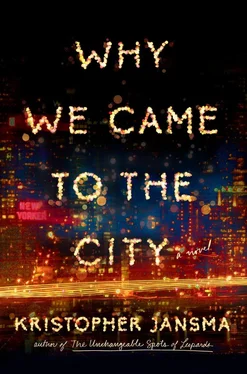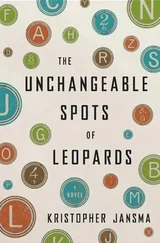And with that Ella grabbed the jar of painty water and dumped its bilious contents directly over her self-portrait. The murky black water tidal-waved in all directions, mostly back onto her own lap, and she jumped up, as startled as if it hadn’t been she who’d poured it out. Shadows leaked into the paper, thick drops running down the length of the self-portrait and off the edge. Already it was pooling heavily under her stool on the floor.
“What happened ?” Sissy shouted, rushing over.
Ella gently lifted the soggy edges of the portrait. Its agonized smile now peered out from behind a thick gray fog, but the smile on Ella’s own face was nothing short of spectacular — cheeks rising so high that they fully engulfed her eyes.
“Darling, what happened?” Sissy asked again.
“Clumsy me,” Jacob said quickly. “My fault.”
Which, he supposed, in a way, it was.
APRIL
After that, Jacob began noticing Ella almost everywhere. She seemed to have only one friend — Maura, a mousy girl with greasy hair who wedged herself across from Ella during mealtimes. Ella seemed to politely tolerate her presence, though something told Jacob that she’d be far happier sitting alone with her book than discussing the weather, the ABC primetime lineup, and what nail polish they’d wear again when they finally got home. But steadily Jacob noticed that Ella (and often Maura) was looking at him, then quickly away.
During group sessions with Dr. Feingold, Ella began to sit in the chair closest to the chessboard where Jacob stationed himself. When he led the patients down the hall after sessions, she invariably walked at the front of the line. In the common room, he would rotate positions periodically, to try to keep an eye on the rowdiest groups of patients. Slowly he became aware that whenever he moved locations, she followed, orbiting him like a moon. During meals Jacob would sit with the other orderlies at a long table near the side of the room, and wherever he sat, whichever direction he faced, Ella would sit one table over, no more than a few feet away.
“Someone’s got a little crush on you,” remarked Paul.
“What?” Jacob asked. “A what?”
Paul smirked and made rapping motions with his hands. “A little infatuation with your situation. A yen for your zen, man. Some uncomplicated admiration. Some pokey little puppy love. A hankering for your—”
Jacob didn’t want to know how he’d finish that rhyme.
“Die in a fire, Paul.” He stood to leave despite Paul’s assurances he’d only been kidding.
It was pouring outside, and Jacob didn’t feel much like a walk anyway, so he spent the rest of the break in his bathroom stall, quiet except for the echoes of his sandwich being eaten.
Not that she didn’t seem, well, better since he’d spoken to her in the art lab that day. Her “Portrait of Ella in Gray” was now hanging up in the common room to everyone’s frank admiration. And he hadn’t done anything wrong. He’d never laid a finger on her, even when she’d jumped up from spilling the jar — and this was more than he could say for some of the actual doctors. Little Dr. Rutherford, with his gross mustache, had allegedly had a three-year affair with a former patient, a gifted trombonist with a drinking problem, yet he was still working down on Ward II as if nothing had ever happened. Dr. Parker, a behaviorist with a husband and kids at home, had last year started sleeping with a janitor in the little-used fourth-floor library. And Dr. Harrison, who still ran Ward I, had actually married a former patient of his from another hospital where he’d worked in the early 1970s. Everybody knew about it. They had an annual Christmas party at their house in Greenwich; Oliver had gone many times.
It always seemed to Jacob that Oliver lived vicariously through these stories at the same time that he lived in constant terror of them — a good lawsuit being all that stood between Anchorage House and total collapse. In honest moments, Jacob even wondered if Oliver didn’t enjoy sleeping with him so much as doing so beneath a Sword of Damocles.
For the hundredth time, Jacob thought about walking out on the job, on Oliver, on this life. Of decking Paul in the mouth before he did. Of calling Sara, only he had no idea where to begin. She was still after him about his address for the Save the Date card. She wanted to know if she could mail it to Oliver’s place, or to Anchorage House — did he have a mailbox there? Jacob just said he was looking into it.
As he passed by the art room, he checked to see that Sissy wasn’t inside, then walked slowly around the room, pausing in the far corner by the bowls, pencil cups, and coffee mugs that the patients had made last month. They couldn’t keep them in their rooms, now that they’d been fired, because they might shatter them and harm themselves with the jagged bits, so these eminently functional artworks sat here, functionless, until their makers headed home. Jacob casually inspected Ella’s mug. He smiled proudly. What a perfectly sane mug! A golden pattern was carved around the top edge — no, not a pattern but some kind of incoherent lettering. At first he thought maybe she was insane after all, but upon closer inspection, he realized that it wasn’t merely Greek to him. It was Greek, Όλυσσεύ, repeated all the way around.
Jacob hadn’t read those ancient letters in years, but he knew the name of the epic hero of the Odyssey when he saw it. Odysseus. There had been a time in his life when he’d been able to recite whole sections of it from memory ( Sing to me of the man, Muse, the man of twists and turns driven time and again off course ), usually while quite drunk at the sort of jugular parties that nobody ever threw anymore. Four semesters of Attic Greek, studying crumbling dusty books in forgotten corners of the library, translating words that had been translated a million times before. Words that were meaningless claptrap to everyone else in his universe, as if poetry alone weren’t a dead-enough, lost-enough language. Sometimes it seemed as if he’d spent twenty-some years working his ass off to ensure he’d have practically nothing in common with anyone.
“Jacob?” The lights came buzzing on as Sissy Coltrane blew into the room.
“Hey there,” he said with a forced wave, well aware that he was holding Ella’s mug awkwardly in his other hand.
“Looking for something?”
“Pencils,” Jacob blurted out. “We’re all out. Over in the lounge. Dr. Boujedra said I should come in here to see if you had any extra.”
Sissy fished around in a drawer until she produced a fistful of pencils. “Oliver’s usually so good at keeping the supplies on order,” she said. “That’s Ella’s mug there. She’s got quite an eye. Smart, too. Oliver told me she got some kind of Presidential Scholarship last year, right before she came back.”
She had called Oliver “Oliver” twice now.
“What’s her deal?” Jacob asked, while Sissy crossed to a refrigerator in the corner where she kept open paint jars. She pulled out a brown paper bag with a greasy spot on one side. “She’s so smiley most of the time. You sure she’s not kind of coo-coo?”
Sissy pulled out a fat, cold egg roll. “Jacob, you know I can’t discuss that kind of thing.”
Jacob rolled his eyes. As if she and “Oliver” and Paul and everyone else didn’t spend half their lives gossiping about which patients saw chartreuse elephants and which had been arrested for pulling the emergency brakes on the subway and which had been found naked on the roof, covered in glue and feathers torn from pillows, trying to fly to Mars.
“Not such a strange case. We’ve tried all kinds of medications, but she still becomes severely depressed by the strangest things. Oliver described it really well the other day — what did he call it? Oh yes, he said it’s like a hypersensitivity. An ‘extreme adjustment disorder.’ Like an acute stress disorder, only the stressors aren’t unreasonable or unidentifiable things.”
Читать дальше












